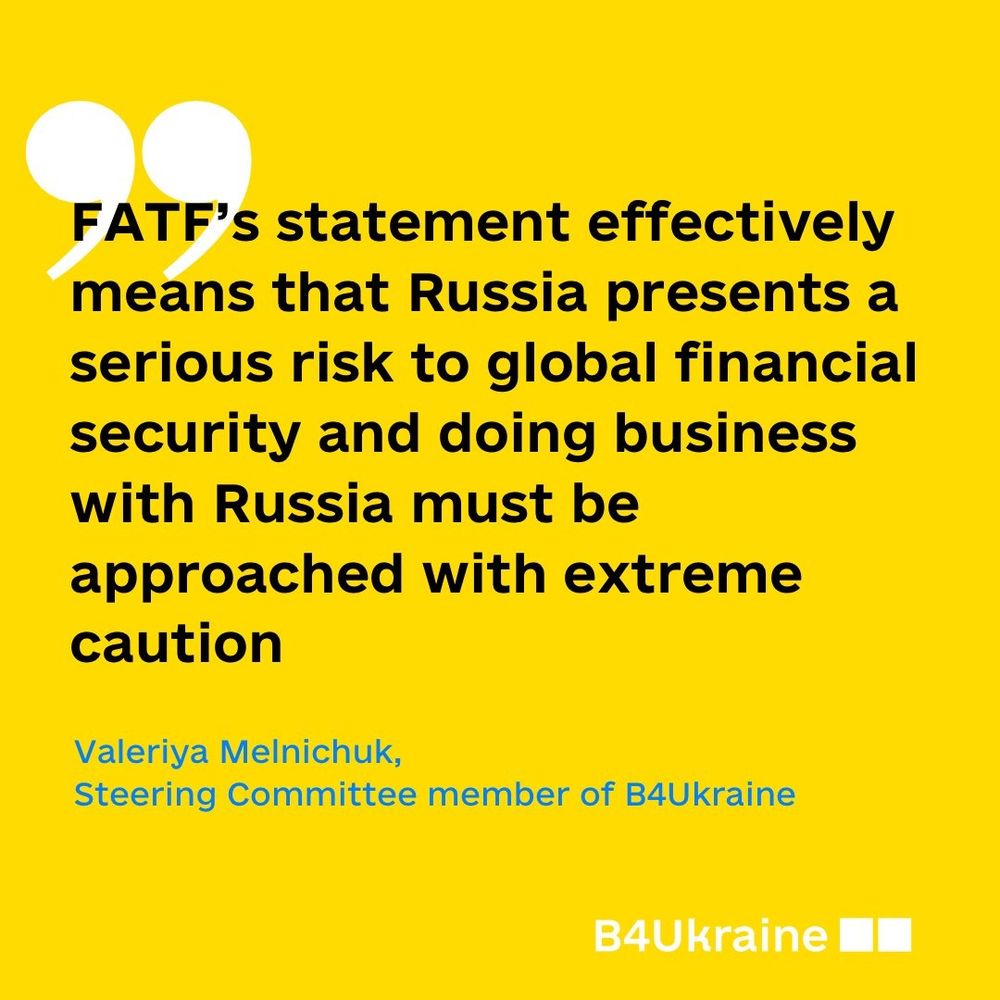
The Business for Ukraine Coalition (B4Ukraine) welcomes the suspension of Russia’s Financial Action Task Force (FATF) membership and the clarifications of risks to the global financial system emanating from Russia.
“FATF’s statement effectively means that Russia presents a serious risk to global financial security and doing business with Russia must be approached with extreme caution,” said Valeriya Melnichuk, Steering Committee member of B4Ukraine.
“Businesses must further enhance their due diligence and risk assessment, and governments now need to step in and issue advisory guidance to the markets to highlight the expanding galaxy of reputational, legal and material risks doing business in or with Russia entails.”
FATF is a Paris-based intergovernmental organisation founded on the initiative of the G7 to combat money laundering, terrorism financing and proliferation financing. FATF members include 39 countries, including the United States, India, China and Saudi Arabia, as well as European countries such as Britain, Germany and France and the EU as such.
The decision was made by consensus which means China, India, Brazil, South Africa and other less enthusiastic supporters of Ukraine supported this decision.
The main consequences of the decision will be that Russia can no longer attend FATF meetings, nor can it access FATF documents, stripping Russia of its ability to influence decision-making processes within FATF. It significantly reduces Russia’s impact on third countries, including non-FATF members, and within the international system.
The FATF statement highlights that arms trade between Russia and United Nations sanctioned jurisdictions (Iran and North Korea) is a global and dangerous threat. FATF’s emphasis on malicious cybercrime emanating from Russia acknowledges that Russia is unable to combat the proceeds of such criminal activities adequately. All cyber and digital-related transactions emanating from Russia should be reviewed with heightened scrutiny.
FATF reiterates the need for all jurisdictions to monitor the emerging risks from Russia’s attempts to circumvent sanctions introduced against Russia for its invasion of Ukraine. All countries and entities should consider implementing measures to protect themselves from risks of potential assistance in sanctions circumvention.
Responding to FATF’s decision, Ukrainian Finance Minister Serhiy Marchenko stated: “It’s not enough but it’s an important step in the right direction.”
Although suspended, Russia remains a FATF member. The natural next step for the group would be to add Russia to its blacklist — a list of countries where the FATF deems businesses and financial institutions are at high risk of exposure to money laundering and terrorist financing. The list currently includes three countries: North Korea, Iran and Myanmar. Risks to the global financial system emanating from Russia merit a comparable response.
As we mark one year since Moscow’s full-scale invasion of Ukraine and nine since the invasion and illegal annexation of Crimea, now is the time for G7, EU, and Swiss governments to urge their businesses to cut ties with Russia and issue market guidance advisories to warn of the heightened risks of continuing business there.
We urge governments and their economic agencies to use all available powers not to support trade and investment activity with Russia, including withholding public money from companies which continue doing business with Russia.
The ongoing corporate complicity in Russian aggression and crimes against humanity in Ukraine must be stopped. Access to the economic resources behind Russian aggression must be blocked.